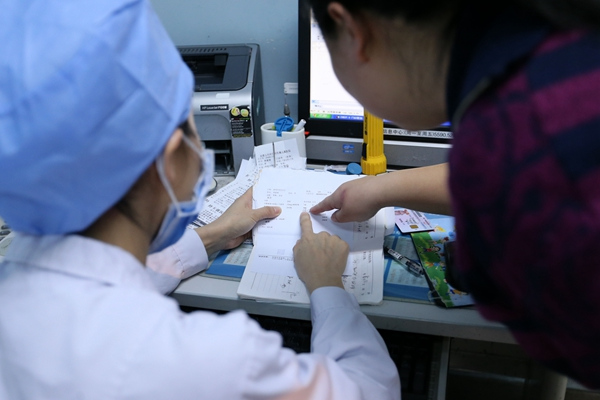
A doctor talks with a parent at the Capital Institute of Pediatrics in Beijing in January. (Photo: China Daily/Zhu Huiqing)
Departmental closures
Tang Jin, a doctor at Nanjing Chest Hospital, blamed the shortage of qualified pediatricians on "a slowness to react" by some governmental departments and the closure of pediatric departments in universities.
In 1998, the Ministry of Education closed all undergraduate pediatrics departments in the country's universities, and suggested free pediatrics training programs at postgraduate level.
"The decision greatly reduced the number of pediatrics graduates," Tang said. "I think the number of excellent doctors in China is falling. Universities used to admit top students, but now fewer top students apply for medical schools in the university entrance exam."
According to Wang, the pass threshold for the pediatrics exam is lower than that for general medicine, so pediatrics students can obtain a license more easily than other specialist doctors. Also, students who fail the general medical exam can opt to choose pediatrics as a career.
"The National Health and Family Planning Commission recently ruled that students who fail to pass the medical practitioners' exam can be given a second chance by taking the pediatrician license exam," she said.
"If their combined score for the two exams reaches the basic level for the medical practitioner's exam, they are qualified to practice as pediatricians. That implies that pediatricians receive the poorest medical training and are the least professional group among specialist doctors. Students applying to work in emergency departments are also given a second chance to obtain their licenses. Although pediatrics and emergency departments are short of doctors, this type of solution should not be used.
"Medical students who value material wealth will abandon pediatrics because of the poor salaries, but those who value spiritual satisfaction will do the same thing because of the shame associated with being a pediatrician."
Shao Wei, who works for Bank of China in Shanghai, said her mother, a retired pediatrician, is taking steps to deal with the shortfall: "My mother, a pediatrician with more than 40 years' experience, told me that she needs to exercise more frequently after hearing the news about pediatric shortages. She said she has to stay in good health to take care of my 4-year-old son and spare him from pediatricians who obtained their licenses by taking two exams."
Baby boom expected
According to the Health and Family Planning Commission of Shaanxi province, less than one-third of its pediatricians are university graduates, while a further one-third graduated from less-prestigious colleges.
All this is bad news for China, where on Jan 1 the government relaxed the national family planning policy that restricted most couples to one child.
The expected baby boom in the coming years will put extra pressure on child healthcare departments and the professionals working in them, making the search for a solution to the problem far more urgent.
According to the National Health and Family Planning Commission, 90 million Chinese women will be allowed to have a second child under the new policy.
Huang suggested that special policies should be applied to pediatric departments to ease the shortage of doctors.
"At present, patients pay 12, 22 or 35 yuan for each consultation, according to the doctor's experience," he said. "Why aren't pediatricians allowed to charge higher fees to treat patients? Compared with other specialist doctors, they have harder working environments and the risks are greater."
Huang also called for more government subsidies and higher salaries for pediatricians to prevent them from leaving their jobs.
Tang urged parents to be more understanding and to be aware of that children often may not be capable of accurately describing their symptoms, which can result in their treatment taking far longer than treatment for adults.
Wang believes the status of pediatricians must be upgraded to encourage students to choose the discipline. "Two years ago, an investigation by the National Association of Pediatricians showed that China lacked 200,000 pediatricians. But only 5,000 pediatricians can be trained and begin practicing in the coming five years," she said.
"First, the Ministry of Education should restore pediatrics to the list of undergraduate degree programs. Second, society as a whole needs to value the work of pediatricians and make them proud of the job they do. If that doesn't happen, the situation will continue to deteriorate."
Authorities prepare to deal with shortfall
Faced with a severe shortage of pediatricians and the expected baby boom after the relaxation of the national family planning policy, many areas and regions are taking steps to deal with the problem.
Under a program released by the Health and Family Planning Commission in Guangzhou, Guangdong province, the city's medical school will provide training based on demand to ease the pediatrician shortage.
Under the plan, before students are admitted to college, they will sign agreements with hospitals or health authorities that will provide partial funding for their studies. Upon graduation, they will be obliged to return to the hospitals to work. Alternatively, hospitals may send existing members of staff to train as pediatricians.
Provincial health authorities will establish pediatrics majors in colleges, such as Guangzhou Medical University, to train more doctors.
The authorities in Guangzhou will explore the provision of subsidies to pediatrics departments based on the number of beds, and establish a more rational evaluation system to ensure better wages to promote the speciality, the commission said.
The distribution of pediatric resources in Guangzhou will be overhauled, and authorities will encourage private companies to build children's hospitals.
In January, the government of Dalian, Liaoning province, released a guideline aimed at developing pediatricians as "urgently needed special talents". Under the guideline, pediatricians will enjoy favorable employment, remuneration and training policies.
The city aims to train 300 more pediatricians by 2019, and also employ a number of experienced pediatricians from home and abroad within three years, including 30 with doctorates.


















































